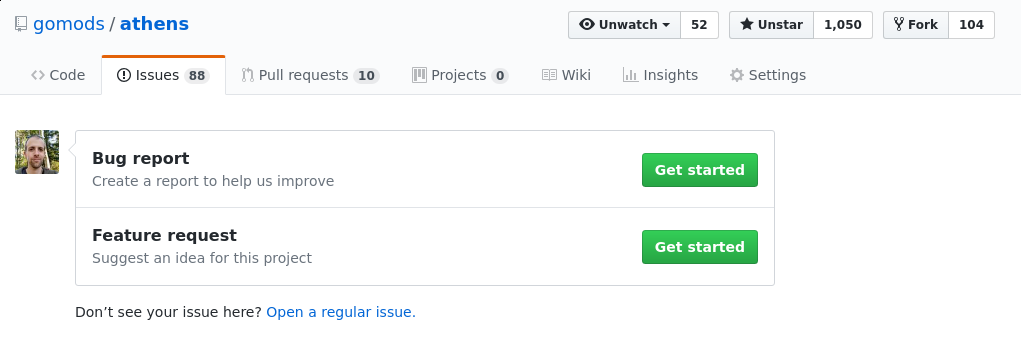Github
Using GitHub
We use GitHub to host the remote copy of our repository and both track our issues and manage our pull requests. If you haven’t signed up before, take a minute to go do that now. We’ll be right here when you get back.
Issues
On GitHub we use the concept of an issue to record every change needed in our code base. This means ideas, bugs, features, support, even just discussions.
Never hesitate to open an issue if you have question about the code or think you may have found a bug. Sometimes people will find part of the documentation or instructions difficult to follow, let us know if this happens.
In particular for our project on GitHub, we have a template for Bug Reports and Feature Requests with one for Proposals .. proposed. When you click on ‘New Issue’ you will be given a choice of which template to start with, if they do not seem to fit your need there is an option to ‘Open a regular issue’ - which is blank.
Forks
In order to keep things a bit tidy in our main repository, we all do work on what is called a fork before creating a pull request. A fork is essentially a copy of a repository that is owned by your GitHub account. You can create as many branches as you like there and don’t be shy with creating commits. We will squash them all into one before we merge, more on that below.
But first take a minute to read this awesome post on creating and maintaining a fork of the project. It even goes into adding other collaborators forks as remotes which you will find useful as you start working more and more with other contributors.
Pull requests
Brian Ketelsen created an awesome video on making your first open source pull request, for an overview of the process go watch that now. There’s also a great video series on contributing to an Open Source project by Kent C. Dodds.
When we receive a new pull request, it may take time for a maintainer or other contributor to get to it, but when we do a few things will happen.
You can expect at least a few comments, don’t let them discourage you though. We are all trying to help one another write the best code and documentation possible, all criticism should be considered constructive.
If you feel like it is not, please do not hesitate to reach out to one of the maintainers. We take our code of conduct very seriously.
Most likely one or more contributors and maintainers will leave a review on your
pull request. You can discuss the changes requested in the pull request itself,
or if you need help with something in particular you can reach out to us in the
#athens channel on Gophers Slack.
After all requested changes are resolved a maintainer will give it a final look and as long as our continuous integration passed they will merge it with the main branch.
Project process
Let’s just go over a quick general guideline on contributing to Athens.
Find an issue
When you see an issue you would like to work on, if no one else has expressed interest please comment on the issue with something like:
- I will take this
- I would like to work on this
This let’s other contributors know someone is working on it, we all know free time is hard to get and don’t want anyone wasting theirs.
If you don’t see an issue for your bug or feature, please open one to discuss with the community. Some things may not be in the best interest of the project, or may have already been discussed.
If your issue is something very small, like a typo or broken link, you may skip straight the pull request.
Open a pull request
After you have created a branch on your fork, and made the changes. Please make
sure all tests still pass, see DEVELOPMENT.md for details. Then after you push all changes
up to your fork, head over to Athens to open a pull request. Usually,
right after you have pushed a new branch and you visit the original repository,
GitHub will prompt you to open a new pull request. Otherwise you can do so from
the Pull Requests tab on the repository.


